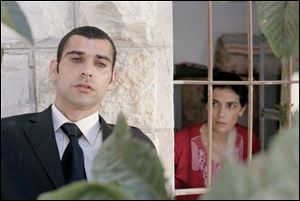
Movie review: Paradise Now ***
12/2/2005
Kais Nashef, left, plays Said, who has been chosen for a martyr s mission. Haim Abbass portrays Said s mother
It's a perverse question, an unthinkable one, but one nevertheless asked in a lot of homes the world over these days: What is the upside of a suicide bombing? Who thinks it's a good idea? Why would people attempt an incomprehensible act - why would they strap explosives to their stomachs, strategically place themselves in a position to harm the maximum number of innocent people, and detonate?
Specifically innocent people, too. Often, the less their victims have to do with the reasons for the suicide bombing, the better.
Why does this happen?
At least two new movies deal with these questions in some form: In Syriana, the fabulously complex Traffic-like take on the petroleum industry that opens next Friday, these questions are answered by a couple of characters who are mistreated by the huge Western conglomerate that employs them and has its mitts in their homeland. Suicide bombing in Syriana stems from individuals who have few options to act on but their rage.
And in Paradise Now, opening today, because suicide bombers are the focus, those questions get answered with more depth but not the poignancy. In both cases, however, the answer to those questions boils down to desperate men - recognizable, desperate men.
Not bogeymen, just men.
And in both films, the uncomfortable lesson you leave with is this: We will never stop suicide bombers until we recognize that they are not wild-eyed movie villains with hoods and machine guns. We don't have to respect them, coddle them, agree with them. We just have to realize that these are people with reasons - in other words, we'll never understand "why they hate us," or how to stop them, until we can put a face on the terrorist.
Until we know who they are.
Uncomfortable yet?
Provocatively stalwart in its approach and evenhanded to the end, Paradise Now refuses to justify or condemn. Co-financed by Palestinian and European producers and shot around the West Bank, it follows two Palestinian men as they prepare to blow themselves up in a crowded Tel Aviv spot. Their reason (or rather, their rhetoric) is more or less "No security for us, no security for them" - "them," of course, being the state of Israel.
The "Us" is even more provocative: When we first see Said (Kais Nashef) and Khaled (Ali Suliman), we instinctively assume others we've yet to meet will become the suicide bombers. They are not obviously fanatical, murderous, political, religious, or even especially motivated - a pair of auto-repair shop slackers, they don't learn their mission until a friend appears out of nowhere, smiling, to inform them because they once expressed a wish to be martyrs, they have been chosen to attack.
Tomorrow, in fact.
Directed by Hany Abu-Assad, and engaging and slick enough to get distribution from the specialty division of Warner Bros., Paradise Now suffers a bit because of its structure. The majority of the picture involves the men saying their good-byes without saying any actual good-byes. They cannot tell family or friends, and so every interaction, every conversation, becomes fraught with meaning. Not poignancy, but rather specific positions - each person they chat with represents a certain view of suicide bombing, and the whole thing comes off too unwavering.
It's all a bit contrived - way too unflagging considering the determination of Abu-Assad to tease out the gray in a seemingly black-and-white subject. Some agree with their mission. Others with their cause, not their methods. Others disagree all together. For instance, one woman whose father became a martyr gives Said a reality check: He tells her she must be proud of his martyrdom, and she replies that she would rather have him alive than be proud of him. "There are other ways to keep the cause urgent."
Determined to walk a middle ground, on the flip side is a portrait of the Palestinians that is so grim it suggests people with nothing left to lose will instinctively look for meaning in their death. Again, it doesn't aim to forgive the men who inflict carnage, just know who they are; it's that rare picture that knows we feel sympathy for people not by watching them perform cute acts but by observing their real lives.
These are not scary people, per se. What is absolutely terrifying, however, is the third party - the terrorist group, unnamed in the film, but composed of hopeless men who have organized themselves and shut off any arguments. In the end, it's their tidy plan that makes you shudder: a method of murder so routine, it has its own formal steps. And the longer it goes on, the less we seem to understand.
Contact Christopher Borrelli at: cborrelli@theblade.com
or 419-724-6117.